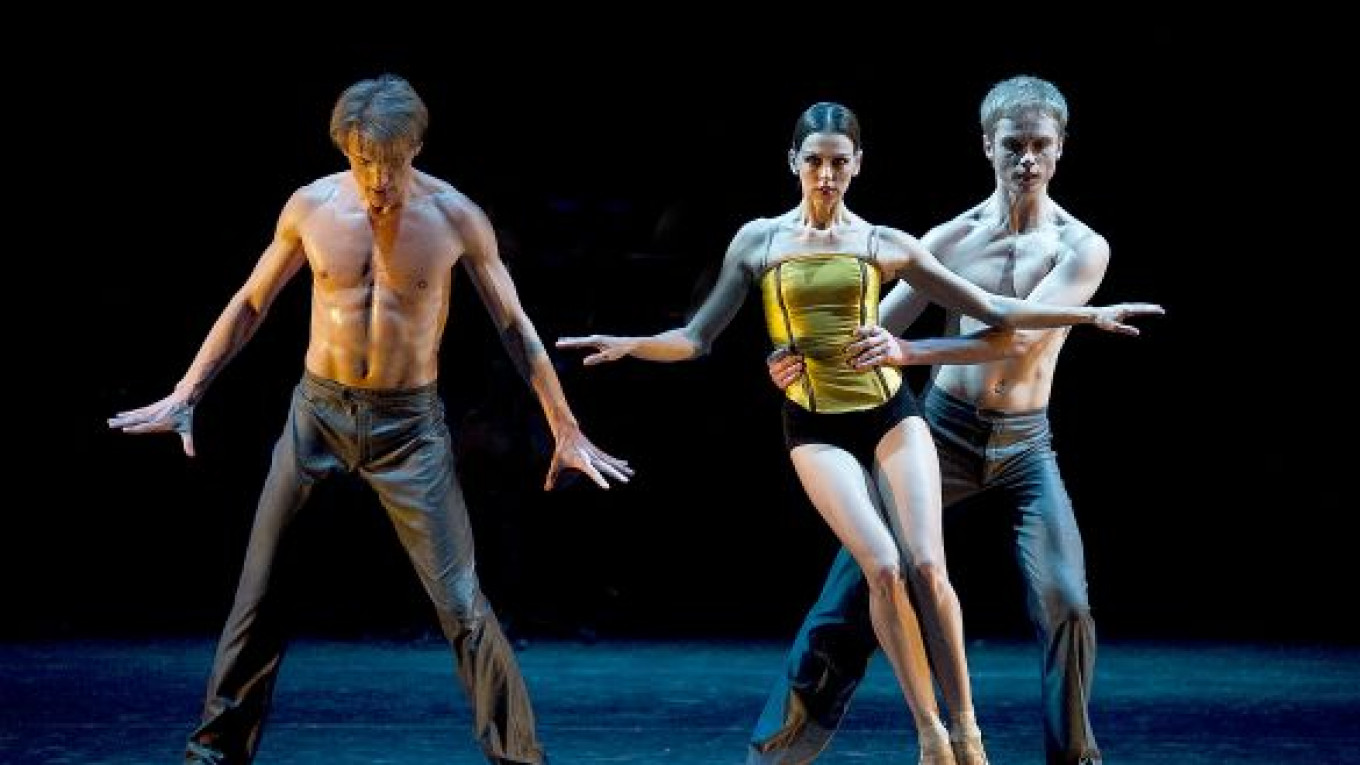The Golden Mask Festival of 2011 comes to end this evening at Gostiny Dvor with the awarding of prizes for what the festival’s juries consider the best in Russian dramatic, musical and puppet theater from the season of 2009-10.
This year’s ballet nominations numbered a mere six, four from St. Petersburg and two from Moscow, with both of the later originating at the Stanislavsky and Nemirovich-Danchenko Musical Theater.
Surprising in their absence were nominees from Russia’s two most important regional ballet companies, those of the Novosibirsk and Perm Theaters of Opera and Ballet. One or both has almost always produced a contender for best production of ballet and the Novosibirsk company has taken the prize at two past festivals.
Golden Mask musical juries have sometimes made rather bizarre choices in the realm of ballet. But that seems unlikely to be the case this year. Three of the nominees clearly stand head and shoulders above the others, and it must surely be apparent to even the least ballet-conscious members of the musical jury that one of them deserves the prize.
The parade of Golden Mask nominees from St. Petersburg began with Alexei Ratmansky’s choreographic setting of Lev Tolstoy’s novel “Anna Karenina,” as staged for the Mariinsky Theater. Premiered in 2004 by the Royal Danish Ballet in Copenhagen, “Anna Karenina” was subsequently mounted by companies in Finland, Lithuania and Poland before arriving in St. Petersburg last April.
Ratmansky related the story reasonably well, but never delved deeply into it. The choreography consisted in very large part of a series of rather unexciting duets that found the heroine alternating between her lover, Vronsky, and her husband, Karenin. As the evening progressed, I increasingly had the feeling that I would rather be at home reading Tolstoy’s novel. The Mariinsky troupe did, however, dance to its usual high standard and the visual images, provided mostly by video projections, were truly amazing.
What saved the show on the night I saw it were the carefully honed portrait of the heroine and extraordinarily lithe dancing of Yekaterina Kondaurova, one of the true marvels of the Russian ballet stage and a contender for the Golden Mask award to best female dancer.
St. Petersburg’s Mikhailovsky Theater presented two nominees. First came a reconstructed version of Pyotr Tchaikovsky’s “Swan Lake” as first created for the Bolshoi in 1901 by its then newly arrived balletmaster Alexander Gorsky and danced at the theater, with numerous revisions, more than 1,100 times over the following 74 years.
The so-called “Moscow Swan Lake” provided an interesting glimpse into Russian classical ballet of former times, proved great fun to watch and was danced with considerable enthusiasm, if not always accuracy, by the Mikhailovsky troupe. Ballerina Yekaterina Borchenko, a Golden Mask nominee, gave a rather sharp-edged performance of the White Swan, Odette, but followed it with a virtuoso display in the role of the evil Black Swan, Odile.
The other Mikhailovsky nominee was a one-act piece called “Minor Sonatas” by Slava Samodurov, a former soloist of the Mariinsky and London’s Royal Ballet. And very “minor” it was indeed, a good journeyman attempt at abstract dance, but offering little to remember once the curtain fell.
The best from St. Petersburg proved to be the 25-minute-long “Quatro” created for the city’s Kolomensky Theatrical Center by Romanian-born choreographer Edvard Krug and danced by four brilliant young soloists from the Mariinsky and Mikhailovsky, Denis Matviyenko (briefly of the Bolshoi), his sister Anastasia, Leonid Sarafanov and Olesya Novikova, all of them deservedly Golden Mask nominees.
For all of its virtues, “Quatro” seems likely to be overshadowed at the awards ceremony this evening by the two nominees from the Stanislavsky and Nemirovich-Danchenko: the theater’s stunning reproduction of “Esmeralda,” as choreographed in 1950 by its long-time balletmaster Vladimir Burmeister, which demonstrated that much life can still be found in a so-called “drambalet” of the Stalinist era; and Czech master Jiri Kylian’s first work with a Russian company, “La petite mort” and “Sechs Tänze,” both classics of the modern ballet repertoire and danced with an outstanding grasp of a style not at all familiar to the theater’s classically trained dancers.
My guess is that the Golden Mask for best production will go to either “Esmeralda” or the Kylian duo, with Krug chosen as best choreographer (since neither Burmeister, long-deceased, nor Kylian, due to his ballets having been first performed elsewhere, is eligible for the award). And best female dancer seems likely to be a neck-and-neck race between Kondaurova and Natalya Ledovskaya, whose agility and astounding leaps in the title role were principal among the many joys of “Esmeralda.”
A Message from The Moscow Times:
Dear readers,
We are facing unprecedented challenges. Russia's Prosecutor General's Office has designated The Moscow Times as an "undesirable" organization, criminalizing our work and putting our staff at risk of prosecution. This follows our earlier unjust labeling as a "foreign agent."
These actions are direct attempts to silence independent journalism in Russia. The authorities claim our work "discredits the decisions of the Russian leadership." We see things differently: we strive to provide accurate, unbiased reporting on Russia.
We, the journalists of The Moscow Times, refuse to be silenced. But to continue our work, we need your help.
Your support, no matter how small, makes a world of difference. If you can, please support us monthly starting from just $2. It's quick to set up, and every contribution makes a significant impact.
By supporting The Moscow Times, you're defending open, independent journalism in the face of repression. Thank you for standing with us.
Remind me later.






